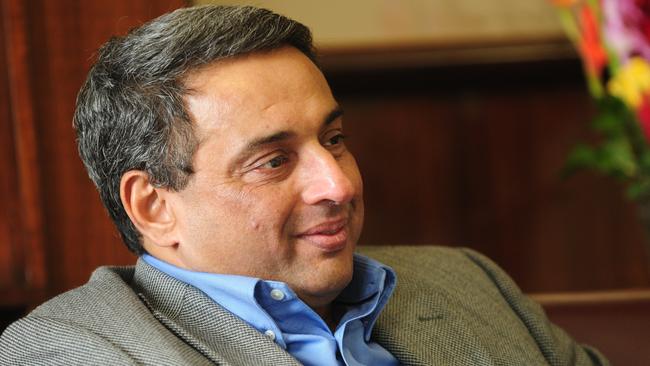Tata Steel warns of no choice but to turn to Russian coking coal if Queensland supply dwindles
Tata Steel will use a meeting with the Palaszczuk administration to say the state could double its coking coal exports to India over the next decade to meet surging demand.

One of the world’s biggest steelmakers will tell the Queensland government a failure to develop new coking coal supplies will inevitably lead Indian producers to buy cheaper supplies from Russia despite sanctions on Moscow.
Tata Steel, which has vowed to stop trading with Russia, will use a meeting with the Palaszczuk government to say the state could double its coking coal exports to India over the next decade to meet surging demand for steel.
However, a failure to bring on new volumes of coal will inevitably result in other Indian steelmakers opting to buy cheaper Russian volumes, meaning Australia misses out on an extra $4bn in annual export revenues from one of its largest trading partners.
“The alternative to Australian coal is Russian coal. I know currently Russia is geopolitically not the best place to buy coal from, but going forward that is an option that Indian companies have,” Tata Steel chief executive TV Narendran told The Australian.
“Tomorrow I have meetings with the Queensland government to look at what we can do together with the mining industry in Australia and the steel industry in India to build a deeper relationship and to increase trade. It‘s about how does the government and industry work together to expand,” said Mr Narendran.
“Metallurgical coal is going to be operating for quite some time to come, particularly in India. I think … the conversation with the government is more about how can we plan better for growth.”
The meeting comes at a sensitive time for the Queensland government, after being slammed by producers for introducing a major windfall royalty tax, prompting warnings that investment in the coal sector could be slashed.
Approvals for new coal mines have also emerged as test for both state and federal governments as pressure grows to limit fossil fuel expansions in Australia.
India has controversially maintained economic relations with Russia despite its invasion of Ukraine in February and increased its imports of coal from Russia in July due to the cut-price supplies on offer during the war.
Tata Steel relied on Queensland for 60 per cent of its coking coal needs, representing a $4.3bn trade between the two countries, and said there was a huge opportunity for the state’s miners if they were able to boost supplies.
“Indian steel consumption or production is going to double in the next 10 years, which means there’s an opportunity for Australia to double its exports of coking coal shipments to India over the next 10 years,” Mr Narendran told The Australian.
“So there‘s a great opportunity for the metallurgical coal industry in Australia to invest and grow in free markets like India.”
The Tata boss, visiting Brisbane for the first time since before the Covid-19 pandemic, said India’s trade with Russia initially started after wild weather in 2019 cut Australia’s exports of the steelmaking material.
“Last time, it was more about how can we have more reliability in terms of supply and what can we tap into to help that context because at that specific point we have variables – that if the supplier is not reliable and India is so dependent on Australian coal – that India will be forced to look at alternate options,” he said.
“Honestly at that time, there was an active movement in India both from the government and industry to look at Russian coal. And in fact that‘s how the Russian coal trade started three of four years back, because supplies from Australia were a bit erratic. And the Russians are offering good quality PCI coal from Vladivostok in the eastern side of Russia. It was easier to get coals from them. So that was the genesis of the Russia idea.”
Russia produces about 75 million tonnes of metallurgical coal a year, according to recent Macquarie figures, and about 360 million tonnes of thermal coal. About 40 per cent of its coking coal is sent into export markets, along with just under half of its thermal coal production.
Its decision to invade Ukraine has again redrawn trade routes and further boosted soaring prices and competition for supplies, including among some of Australia’s oldest customers in Japan, South Korea and Taiwan.
But while Mr Narendran forecast a strong future for India’s trade with Australia in coking coal, he downplayed the likelihood India could displace China as a destination for Pilbara iron ore. Australian iron ore companies have long looked to India’s growing steel industry as a potential growth story for Pilbara exports, with those dreams recently boosted by a joint venture between Indian-controlled Legacy Iron Ore and Gina Rinehart’s Hancock Prospecting over the Mt Bevan magnetite project in Western Australia.
But Mr Narendran said he did not see any real likelihood of an expansion of the iron ore trade between the two countries.
“I don‘t see India as an importer of iron ore, except maybe in an emergency like seven to eight years back because of some legal issues,” he said.
“India has plenty of iron ore and Indian iron ore is of good quality, unlike Indian coal. Tata Steel is already doing 35 million tonnes of iron ore mining, and we are going to do over 50 to 60 million tonnes over the next few years,” Mr Narendran added.





